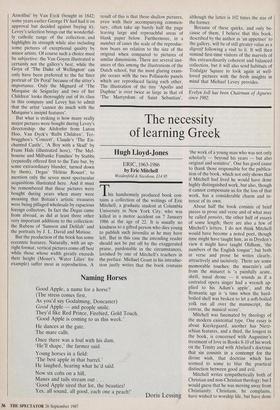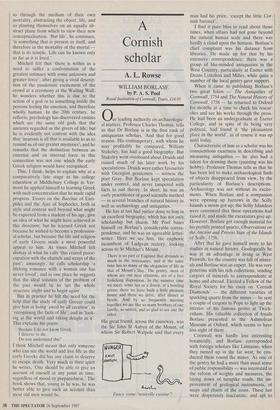The necessity of learning Greek
Hugh Lloyd-Jones
ERIC, 1963-1986 by Eric Mitchell
Weidenfeld & Nicolson, £14.95
This handsomely produced book con- tains a collection of the writings of Eric Mitchell, a graduate student at Columbia University in New York City, who was killed in a motor accident on 7 January 1986 at the age of 22. It is usually no kindness to a gifted person who dies young to publish such juvenilia as he may have left. But in this case the intending reader should not be put off by the exaggerated praise, pardonable in the circumstances, lavished by one of Mitchell's teachers in the preface. Michael Grant in his introduc- tion justly writes that the book contains
`the work of a young man who was not only scholarly — beyond his years — but also original and sensitive'. One has good cause to thank those responsible for the publica- tion of the book, which not only shows that if Mitchell had lived he would have done highly distinguished work, but also, though it cannot compensate us for the loss of that work, has a considerable charm and in- terest of its own.
About half the book consists of brief pieces in prose and verse and of what may be called pensees, the other half of essays of some length; there are also a few of Mitchell's letters. I do not think Mitchell would have become a noted poet, though time might have taught him, as in Dryden's view it might have taught Oldham, 'the numbers of the English tongue'; but both in verse and prose he writes clearly, attractively and incisively. There are some memorable touches: the muezzin's call from the minaret is 'a painfully acute, shrill, nasal drone — it sounds as if a castrated opera singer had a wrench ap- plied to his Adam's apple', and the Romantic age is 'a time when the hard- boiled shell was broken to let a soft-boiled yolk run all over the manuscript, the canvas, the musical score'.
Mitchell was fascinated by theology of the modern existential type. One essay is about Kierkegaard, another has Nietz- schian features, and a third, the longest in the book, is concerned with Augustine's treatment of love in Books 8-10 of his work on the Trinity and with Abelard's doctrine that sin consists in a contempt for the divine wish, that doctrine which has seemed to some to blur the practical distinction between good and evil.
Mitchell writes sympathetically both of Christian and non-Christian theology; but I would guess that he was moving away from Christianity. Christians, he complains, have wished to worship life, but have done
so through the medium of their own mortality, abstracting the object, life, and so planting themselves on an equally ab- stract plane from which to view their new conceptualisation. 'But life', he continues, 'is something that is present in itself, and therefore in the mortality of the mortal that is its temple. Life can be known only so far as it is lived.'
Mitchell felt that 'there is within us a need to suffer a confrontation of the greatest intimacy with some unknown and greater force'; after giving a vivid descrip- tion of the passionate excitement of the crowd at a ceremony at the Wailing Wall, he wonders whether this is due to the action of a god or to something inside the persons feeling the emotion, and therefore wholly human. In the 20th century, he reflects, psychology has discovered entities which are the same old gods that the ancients regarded as the givers of life; but he is evidently not content with the idea that 'neurosis is all that is available to us to remind us of our greater mysteries'; and he remarks that the distinction between an external and an internal force in this connection was not one which the early Greek religion would have recognised.
This, I think, helps to explain why at a comparatively late stage in his college education at Middlebury College in Ver- mont he applied himself to learning Greek with such concentration that he made rapid progress. Essays on the Bacchae of Euri- pides and the Ajax of Sophocles, both in style and content well beyond what might be expected from a student of his age, give an idea of what he might have achieved in this direction; but he learned Greek not because he wished to become a profession- al scholar, but because the life and religion of early Greece made a most powerful appeal to him. At times Mitchell felt dismay at what he calls 'this crazed preoc- cupation with the chattels and strays of the past'; amusingly, he calls scholarship 'a lifelong romance with a woman one has never loved'; and in one place he suggests that the ideal solution of the problem of the past would be to 'set the whole structure alight and to begin again'.
But in practice he felt the need for the help that the study of early Greece could give him in living 'awed by all creation', in 'recognising the facts of life', and in 'look- ing at the world and taking delight in it'. This explains his poem:
Because I do not know Greek
I deserve to die.
Do you understand this?
I think Mitchell meant that only someone who can see the world and live life as the early Greeks did has any claim to deserve to escape death. Very much in their spirit he writes, 'One should be able to give an account of oneself at any point in time, regardless of mood or preparedness.' The book shows that, young as he was, he was better able to give such an account than most old men would be.































































 Previous page
Previous page